-
Title
-
Autographs for Freedom
-
This edition
-
"Autographs for Freedom" . Ed. Julia Griffiths (for the Rochester Ladies' Anti-Slavery Society). Vol. 1: London: Sampson Low, 1853; Boston: J. P. Jewett; Cleveland: Jewett, Proctor, and Worthington, 1853. viii+263 pp.; Vol. 2: Auburn: Alden, Beardsely; Rochester: Wanzer, Beardsley, 1854. 309 pp.
-
Online access
-
• Vol. 1 (London, 1853) (British edition): Available via Google Books and three copies via Internet Archive:
-
Google Books (U of California, Davis copy)
-
Internet Archive (Boston Public Library copy)
-
Internet Archive (Wellesley College copy)
-
Internet Archive (North Carolina State Library copy)
-
• Vol. 1 (Boston, 1853) (US edition): Available online via ECCO and NCCO (subscription required), and via Wright American Fiction, Google Books, and Internet Archive (four copies):
-
Wright American Fiction
-
Google Books (Harvard U copy)
-
Internet Archive (Boston Public Library copy)
-
Internet Archive (Boston Public Library copy 2)
-
Internet Archive (U of Michigan copy)
-
Internet Archive (U of California, Berkeley copy)
-
• Vol. 2 (New York and Auburn, 1854) (US edition): two copies available online via Internet Archive:
-
Internet Archive (Johns Hopkins U copy)
-
Internet Archive (Library of Congress copy)
-
• Vol. 2 (Auburn and Rochester, 1854) (US edition): available online via NCCO (subscription required), and via Wright American Fiction, "Making of America" (U of Michigan), Google Books, and Internet Archive (12 copies):
-
Wright American Fiction
-
"Making of America" (U of Michigan)
-
Google Books (Harvard U copy)
-
Internet Archive (Library of Congress copy)
-
Internet Archive (Harvard U copy)
-
Internet Archive (Boston Public Library copy)
-
Internet Archive (Cornell U copy)
-
Internet Archive (Dickinson College copy)
-
Internet Archive (Wellesley College copy)
-
Internet Archive (Oberlin College copy)
-
Internet Archive (Harvard U copy 2)
-
Internet Archive (U of Michigan copy)
-
Internet Archive (Lincoln Financial Foundation Collection copy)
-
Internet Archive (New York Public Library copy)
-
Internet Archive (U of California, Berkeley copy)
-
Table of contents
-
Volume 1 (from Boston, 1853 edition):
[Julia Griffiths / Preface (v-vi)]
● Hon. Wm. H. Seward / Be Up and Doing (1-3)
● Mrs. H. E. B. Stowe / Caste and Christ (4-6)
● Earl of Carlisle / Letter to Mrs. H. B. Stowe (7-12)
● Mrs. C. M. Kirkland / Momma Charlotte (13-17)
● Hon. Horace Mann / A Name (18)
● Joseph Sturge / Letter (19)
● R. Hildreth / Slavery and Polygamy (20-22)
● John G. Whittier / The Way (23)
● Miss Sedgwick / The Slave and Slave-Owner (24-27)
● Bishop of Oxford / Letter (28)
● Rev. William Goodell / Hide the Outcastes (29-32)
● Rev. Geo. W. Perkins / Can Slaves Rightfully Resist and Fight? (33-40)
● Ebenezer Button / Death in Life (41-42)
● Mrs. C. W. H. Dall / True Reform (43-45)
● J. M. Whitfield / How Long? (46-54)
● Wilson Armistead / Letter (55-58)
● J. M. Eells / Impromptu Stanzas (59-61)
● James M'Cune Smith / John Murray of Glasgow (62-67)
● Lewis Tappan / Power of American Example (68-70)
● Lewis Tappan / The Gospel as a Remedy for Slavery (71-74)
● Rev. C. G. Finney / Letter (74)
● Miss C. E. Beecher / The Slave's Prayer (75-76)
● Hon. Charles Sumner / The Struggle (77)
● Horace Greeley / Work and Wait (78-80)
● Gerrit Smith / The Great Emancipation (81)
● Rev. John Pierpont / Ode (82-84)
● Annie Parker / Passages in the Life of Slave Woman (85-94)
● Annie Parker / Story Telling (95-98)
● Rev. E. Buckingham / The Man-Owner (99-103)
● Rev. F. W. Holland / Damascus in 1851 (104-13)
● Lindley Murray Moore / Religious, Moral, and Political Duties (114-15)
● James G. Birney / Why Slavery Is in the Constitution (116-26)
● Mrs. H. B. Stowe / The Two Altars (127-47)
● Rev. R. R. Raymond / Outline of a Man (148-60)
● Rev. S. J. May / The Heroic Slave Woman (161-65)
● John Thomas / Kossuth (166-73)
● Frederick Douglass / The Heroic Slave (174-239)
● Prof. J. H. Raymond / A Plea for Free Speech (240-55)
● Prof. W. G. Allen / Placido (256-63)
-
Volume 2 (from Auburn and Rochester, 1854 edition):
[Julia Griffiths / Preface (v-vi)]
● Prof. C. L. Reason / Introduction (The Colored People's "Industrial College") (11-15)
● Hon. J. R. Giddings / Massacre at Blount's Fort (16-26)
● Hon. Wm. Jay / The Fugitive Slave Act (27-40)
● Antoinette L. Brown / The Size of Souls (41-43)
● George B. Vashon / Vincent Ogé (44-60)
● Rev. Dr. Wm. Marsh / The Law of Liberty (61-62)
● Theodore Parker / The Swiftness of Time in God (63-69)
● Wm. Wells Brown / Visit of a Fugitive Slave to the Grave of Wilberforce (70-76)
● Dr. W. H. Brisbane / Narrative of Albert and Mary (77-127)
● Hon. Chas. F. Adams / Toil and Trust (128-33)
● Jacob Abbott / Friendship for the Slave Is Friendship for the Master (134-38)
● Anne P. Adams / Christine (139-46)
● J. M. Langston / The Intellectual, Moral, and Spiritual Condition of the Slave (147-50)
● Rev. Dr. Willis / The Bible _versus_ Slavery (151-55)
● W. J. Watkins / The Work Goes Bravely On (156-57)
● Rev. Wm. Brock / Slaveholding Not a Misfortune But a Crime (158)
● Rev. W. Goodell / The Illegality of Slaveholding (159)
● David Paul Brown / "Ere Perennius" (160)
● John S. C. Abbott / The Mission of America (161-62)
● Lewis Tappan / Disfellowshipping the Slaveholder (163-64)
● Wm. J. Wilson / A Leaf from My Scrap Book (165-73)
● Rev. Thos. Starr King / Who Is My Neighbor (174)
● Dr. S. Willard / Consolation for the Slave (175-76)
● Dr. S. Willard / The Key (177)
● Dr. W. Elder / The True Mission of Liberty (178-79)
● Mary Willard / The True Spirit of Reform (180-83)
● J. C. Holly / A Welcome to Mrs. H. B. Stowe, on her return from Europe (184-85)
● Rev. T. W. Higginson / Forward (from the German) (186)
● Thos. Henning / What Has Canada to Do with Slavery? (187-89)
● Rev. Rufus Ellis / A Fragment (190-91)
● John Jay, Esq. / The Encroachment of the Slave Power (192-93)
● Horace Greeley / The Dishonor of Labor (194-97)
● Wm. Watkins / The Evils of Colonization (198-200)
● Hon. Wm. H. Seward / The Basis of the American Constitution (201-06)
● Mrs. C. M. Kirkland / A Wish (207-09)
● C. A. Bloss / A Dialogue (210-24)
● Hon. Gerrit Smith / A Time of Justice Will Come (225)
● Prof. C. L. Reason / Hope and Confidence (226-29)
● Jane G. Swisshelm / A Letter that Speaks for Itself (230-34)
● R. W. Emerson / On Freedom (235)
● Hon. S. E. Sewell / Mary Smith. An Anti-Slavery Reminiscence (236-40)
● Dr. J. McCune Smith / Freedom--Liberty (241)
● Rev. E. H. Chapin / An Aspiration (242)
● Mrs. H. H. Greenough / The Dying Soliloquy of the Victim of the Wilkesbarre Tragedy (243-47)
● Hon. C. M. Clay / Let All Be Free (248-50)
● Frederick Douglass / Extract from a Speech (251-55)
● William D. Snow / Extract from an Unpublished Poem on Freedom
● Rev. H. Ward Beecher / Letter (273-76)
● Mrs. Harriet B. Stowe / A Day Spent at Playford Hall (277-303)
● Mary Irving / Teaching the Slave to Read (304-09)
-
About the anthology
-
● These volumes are not specifically anthologies of African-American writings: they are collections of abolitionist writings. But they include several pieces by African American authors (including Frederick Douglass's "The Heroic Slave") and these particular volumes were published to raise money for Frederick Douglass's newspapers, so they were directly in the service of African American writing in a way that was not generally the case with other abolitionist writings. Even though considerably less than half the material in these volumes is written by African American authors, I include them here in part because they were discussed in Kinnamon's 1997 survey of anthologies of African-American literature and, in part, because they illustrate the collaborations that existed between (white) abolitionists and African American figures such as Frederick Douglass that led to the wider circulation of African American writings. But most of all, these volumes do preserve some writings by African American figures that it would be a shame to leave out of this project.
-
● The conceit of these volumes--that they present the signatures ("autographs") of the individual contributors under their pieces--is complicated in the case of the two pieces by "Annie Parker": her signature appears, like those of the other contributors, but "Annie Parker" is a pseudonym. The story she contributed, "Passages in the Life of a Slave Woman," is written in the voice of a slave woman and the work has been anthologized as possibly by an African American author (e.g., the Library of America volume "American Antislavery Writings" [2012] includes the piece and says of the author: "Possibly she was a former slave" [p. 666]), but it has now been established that "Annie Parker" was a pseudonym used by Anne P. Adams, a white woman from New England: see Jeffery A. Duval, "Anne P. Adams, 'An Orphan Girl of New England': The Search for Annie Parker," "New North Star" 2 (2020): 61-62.
-
● The title "Autographs for Freedom" was proposed by Harriet Beecher Stowe, as noted in "Frederick Douglass' Paper" (13 Aug. 1852): "the gifted authoress of 'Uncle Tom's Cabin' has christened it 'Autographs for Freedom'" (quoted in "The Heroic Slave: A Cultural and Critical Edition" 2015, p. xxviii). (Douglass's contribution--"The Heroic Slave"--to the 1853 volume was reprinted in his own paper in March 1853: Frederic May Holland remarks that the story "is based on [the] actual adventures of Madison Washington, who set himself free by his own courage some ten years before" ("Frederick Douglass: The Colored Orator" [New York: Funk & Wagnalls, 1891], 220).
-
Reviews and notices of anthology
-
• "Athenaeum" 12 Feb. 1853: 191. [cited in Fritz 2010: 93]
-
• [Advertisement]. "Frederick Douglass's Paper" 13.9 (17 Feb. 1860): p. 4, col. 4: "Autographs for Freedom. Containing contributions from Giddings, Wm. Jay, Seward, McCune Smith, Beecher, Douglass, Chapin, Higginson, Mrs. Stowe, Tappan, Goodell, Gerrit Smith, John Jay, Greeley, Profs. Reason and Vashon, C. M. Clay, and other distinguished advocates of Freedom. Edited by Julia Griffiths. 320 pages. Price $1.00." (See also the images reproduced above of advertisements from newspapers and magazines in Edinburgh 1853, Sydney 1854, and London 1857.)
-
Commentary on anthology
-
• Griffiths was the English associate of Frederick Douglass in the antislavery cause: "In addition to work by white contributors, the volume[s] contained prose by Charles Reason, George Vashon, J. McCune Smith, and John Mercer Langston, poems by William Wells Brown and Vashon, and Douglass's nonfiction short story 'The Heroic Slave'" (Kinnamon 1997: 461). [Kinnamon states that the volumes contain both prose and poetry by George Vashon: in fact, the poetic extract in the 1854 volume on "Vincent Ogé" is the only contribution by Vashon in either volume.]
• "A collection of signed articles, poems, etc., by men and women prominent in the anti-slavery movement" (WorldCat).
• In an exhibition at U of Utah Libraries, vol. 2 is described as follows: "A collection of facsimile-signed articles, poems, and other writings by men and women prominent in the anti-slavery movement, published to assist Frederick Douglass in raising funds for his newspaper. One contribution is by James Monroe Whitfield, born into a free black family in New Hampshire in 1822. In a poem, he wrote, “How long, O gracious God! How long/Shall power lord it over right?” Other contributors include Thomas Wentworth Higginson, Horace Greeley, Harriett Beecher Stowe, Frederick Douglass, and Ralph Waldo Emerson. In the preface to this second series (the first was published in 1853), editor Julia Griffiths wrote “…we greet thankfully those who have contributed of the wealth of their genius; the strength of their convictions; the ripeness of their judgment; their earnestness of purpose; the generous sympathies…ere the chains of the Slave shall be broken, and this country redeemed from the sin and the curse of Slavery.”"
-
U of Utah Libraries
-
● William Wells Brown (who was himself a contributor to the volumes) quotes from the anthology in "The Black Man: His Antecedents, His Genius, and His Achievements" (New York: Thomas Hamilton, 1863):
"In his splendidly conceived comparison of Frederick Douglass to S. R. Ward, written for the 'Autographs for Freedom,' Professor William J. Wilson says of the former, 'In his very look, his gestures, his whole manner, there is so much of genuine, earnest eloquence . . .'" (183).
Speaking of Charles L. Reason, Wells writes: "Were I a sculptor, and looking for a model of a perfect man in personal appearance, my selection would be Charles L. Reason. As a writer of both prose and poetry he need not be ashamed of his ability. . . . In a well-written essay on the propriety of establishing an industrial college, and the probable influence of the free colored people upon the emancipated blacks, he says, . . . In the 'Autographs for Freedom,' from which the above extract is taken, Professor Reason has a beautiful poem, entitled 'Hope and Confidence,' which, in point of originality and nicety of composition, will give it a place with the best productions of Wordsworth" (188-89).
-
● Stepto, Robert B. "Storytelling in Early Afro-American Fiction: Frederick Douglass's 'The Heroic Slave.'" "Black Literature and Literary Theory." Ed. Henry Louis Gates, Jr. New York: Methuen, 1984. 175-86:
In the financial crisis that ensued for Frederick Douglass's newspaper after his break with the Garrisonians, "Various fund-raising activities were pursued, among these being the publication in 1853 of 'Autographs of Freedom,' a collection of anti-slavery writings edited for the Rochester Ladies' Anti-Slavery Society so that they might assist in raising funds for 'Frederick Douglass's Paper'. While not often cited, 'Autographs for Freedom' is worthy of the attention of scholars of Afro-American literature for at least three reasons. First, as a fund-raising mechanism for Douglass's paper, commissioned by women abolitionists, it stands as remarkable evidence of the alliance Douglass was able to strike with various women's organizations, especially after he had been the 'only man to take a prominent part in the proceedings of the Equal Rights for Women Convention' in July of 1848. Second, the list of contributors to 'Autographs for Freedom' provides us with a roster of those individuals, black and white, who presumably were willing--or at least not afraid--to align themselves with Douglass and his newspaper even after both had been in some sense 'blacklisted' by the Garrisonians. The contributors included William H. Seward, Harriet Beecher Stowe, Horace Mann, Richard Hildreth, John Greenleaf Whittier, James M. Whitfield, James McClure Smith, Lewis Tappan, Horace Greeley and James G. Birney. Finally, the volume is worthy of interest because Douglass's own contribution to it is not an extract from a famous speech (such as 'What to the Slave is the Fourth of July?' or 'The Nature of Slavery'--both of which were written and available for inclusion at the time) but a novella entitled 'The Heroic Slave', a new work in what was for Douglass a new form" (176-77).
-
● Manning Marable, commenting on early anthologies of African American writing, remarks that the "first" such anthology, "Les Cenelles" (1845), "was a collection of poems by New Orleans Creoles, and it completely ignored the pressing issues in contemporary black culture. The second, 'Autographs for Freedom' (1853), had a different agenda; a product of the antislavery movement, its entire raison d'être was to expose its readers to the evils of slavery and proselytize for its abolition. In this context, African Americans were a people to be pitied; their interior lives were scarcely a consideration" (Manning Marable. "Freedom on My Mind: The Columbia Documentary History of the African American Experience." Ed. Manning Marable, Nishani Frazier, and John McMillian. New York: Columbia UP, 2003. xviii).
-
See also
-
• Fritz, Meaghan Morrissa. "Traveling Abolitionism and Female Editorship: Performing the Gift Book Genre in Nineteenth-Century Abolitionist Culture." MA Thesis. Georgetown U, 2010. vi+95 pp. [Available online https://repository.library.georgetown.edu/bitstream/handle/10822/553006/fritzMeaghan.pdf?sequence=1&isAllowed=y ]
• Levy, Valerie. "Lydia Maria Child and the Abolitionist Gift-Book Market." "Popular Nineteenth-Century American Women Writers and the Literary Marketplace". Ed. Earl Yarrington and Mary De Jong. Newcastle upon Tyne: Cambridge Scholars, 2007. 137-52.
• McKivigan, John R., and Rebecca A. Pattillo. "Autographs for Freedom' and Reaching a New Abolitionist Audience." "Journal of African American History" 102.1 (Winter 2017): 35-51. https://doi.org/10.5323/jafriamerhist.102.1.0035
• Sydelnik, Stefanie A. "Antislavery Gifts: The Adaptation of the American Gift Book for Abolitionist Purposes, 1834-1858." Diss. U of Rochester, 2016. (Includes chapter on Stowe's "The Two Altars" and Douglass's "The Heroic Slave" in "Autographs for Freedom.")
• Thompson, Ralph. ""The Liberty Bell" and Other Anti-Slavery Gift Books." "New England Quarterly" 7.1 (1934): 154-68.
-
Other works by Julia Griffiths:
• Griffiths, Julia."Circular: The Second Report of the Rochester Ladies' Anti-Slavery Sewing Society". Rochester, N.Y.: publisher not identified, 1853. Print.
• Griffiths, Julia, and Harriet B. Stowe."Voices of Freedom". New York: Worthington Co, 1850. Print.
-
● A more comprehensive collection of abolitionist writing is available in "American Antislavery Writings: Colonial Beginnings to Emancipation," ed. James G. Basker. New York: Library of America, 2012. This volume includes a significant number of African-American authors (e.g., Phillis Wheatley, Jupiter Hammon, Prince Hall, Olaudah Equiano, Benjamin Banneker, Boston King, Boyrereau Brinch, James Forten, Prince Saunders, George Moses Horton, David Walker, Charles Ball, Moses Roper, James Williams, Henry Highland Garnet, William Wells Brown, Henry Bibb, Henry "Box" Brown, Frederick Douglass, Solomon Northup, James McCune Smith, Harriet Tubman, Martha Griffith Browne, Jermain Wesley Loguen, Harriet Ann Jacobs, Martin R. Delany) and some of the works/authors featured in Griffiths's volumes reappear in this anthology,
-
Google Books (limited preview)
-
• On Griffiths' collaboration with Frederick Douglass, see Erwin Palmer, "A Partnership in the Abolition Movement," "University of Rochester Library Bulletin" 26.1-2 (Autumn-Winter 1970-71).
-
U of Rochester Libraries
-
• A letter from Henry Wadsworth Longfellow and one from Harriet Beecher Stowe, in relation to these volumes, are to be found in the Porter Family Papers, U of Rochester: Susan F. Porter was active, from the beginning, in the Rochester Ladies Anti-Slavery Society (the sponsor of these volumes).
Longfellow declined, however, the request to contribute to the volume: "When Susan Porter of the Rochester Ladies Anti-Slavery Society asked for a contribution for 'Autographs for Freedom,' he [Longfellow] . . . passed, even though Frederick Douglass had supported the request, in a note he had scribbled on the letter, declaring that he should be '"most" grateful, as one of the oppressed, if you will favor the Society with an article.' Longfellow's response was uncharacteristically cold: 'as I have already published "Poems on Slavery" [1842], . . . I think no one, who cares about the matter will be at any loss to discover my opinion on that subject' ("Letters" 3:348; 8 June 1852). . . . Longfellow's refusal to participate in this project seems at first puzzling . . . But what really was at stake here was again Longfellow's desire to be appreciated and known for his poetry rather than for his views, though the latter might very well be implicit in the former. . . . Those who want to accuse Longfellow of political indifference will find their story considerably complicated by his account books, which prove that, even as he refrained from making public speeches against slavery, he gave money to support the abolitionist cause, individual slaves, and African churches. . . .Longfellow continued to give money to African-American churches virtually until the day he died [24 March 1882]" (Christoph Irmscher. "Public Poet, Private Man: Henry Wadsworth Longfellow at 200." Amherst: U of Massachusetts P, 2009. 114-15).
-
U of Rochester, River Campus Libraries
-
•Covert, Susan J. "Rochester Ladies' Anti-Slavery Society." "The Encyclopedia of African American History, 1619-1895" (2006).
-
• Frederick Douglass. "The Heroic Slave: A Cultural and Critical Edition." Ed. Robert S. Levine, John Stauffer, and John R. McKivigan. New Haven: Yale UP, 2015.
-
Cited in
-
• Kinnamon 1997: 461. [only refers to 1853 volume]
-
Item Number
-
A0002
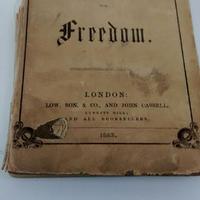 Front cover (London, 1853)
Front cover (London, 1853)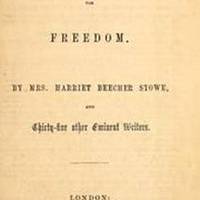 Title page (London, 1853)
Title page (London, 1853)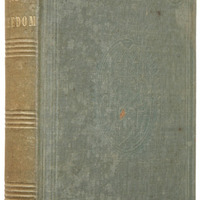 Front cover and spine (Boston, 1853)
Front cover and spine (Boston, 1853)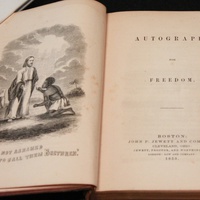 Title page and frontispiece (Boston, 1853)
Title page and frontispiece (Boston, 1853)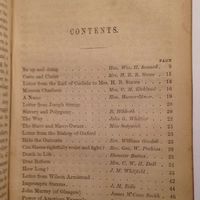 Table of contents1 (vol. 1)
Table of contents1 (vol. 1)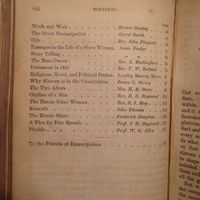 Table of contents 2 (vol. 1)
Table of contents 2 (vol. 1)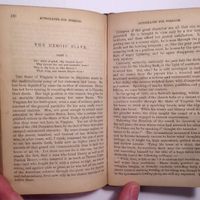 Sample page image (pp. 120-121) (vol. 1)
Sample page image (pp. 120-121) (vol. 1)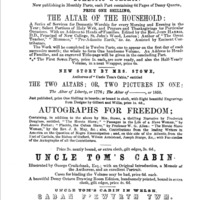 Advertisement for Autographs for Freedom (Edinburgh Review vol. 98 [July-Oct. 1853])
Advertisement for Autographs for Freedom (Edinburgh Review vol. 98 [July-Oct. 1853])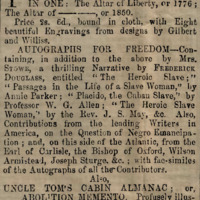 Advertisement for Autographs for Freedom (The Empire [Sydney] 21 June 1854, p. 1)
Advertisement for Autographs for Freedom (The Empire [Sydney] 21 June 1854, p. 1)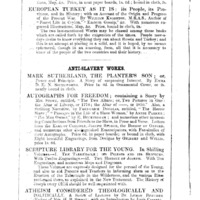 Advertisement for Autographs for Freedom (A Shilling's Worth of Reading [London: W. Kent, nd (1857)])
Advertisement for Autographs for Freedom (A Shilling's Worth of Reading [London: W. Kent, nd (1857)])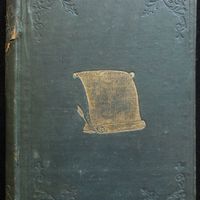 Front cover (vol. 2, 1854)
Front cover (vol. 2, 1854)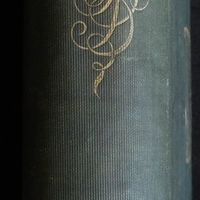 Spine (vol. 2, 1854)
Spine (vol. 2, 1854)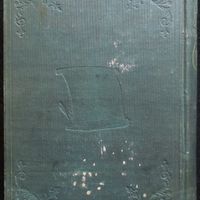 Back cover (vol. 2, 1854)
Back cover (vol. 2, 1854)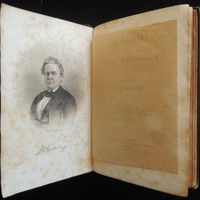 Frontispiece (vol. 2, 1854)
Frontispiece (vol. 2, 1854)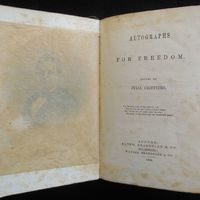 Title page (vol. 2, 1854)
Title page (vol. 2, 1854)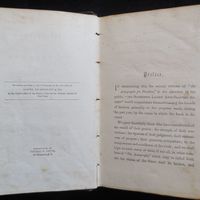 Copyright page and preface 1 (vol. 2, 1854)
Copyright page and preface 1 (vol. 2, 1854)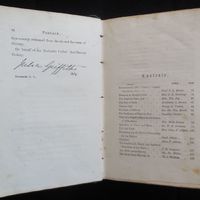 Preface 2 and Table of contents 1 (vol. 2, 1854)
Preface 2 and Table of contents 1 (vol. 2, 1854)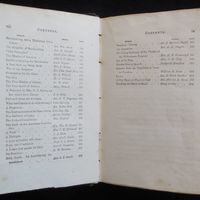 Table of contents 2 (vol. 2, 1854)
Table of contents 2 (vol. 2, 1854)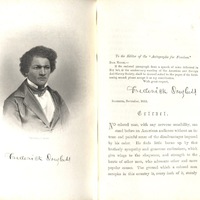 Sample page image (vol. 2, 1854)
Sample page image (vol. 2, 1854)

















